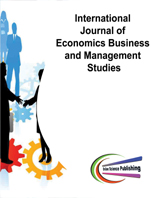Work-Family Conflict and Safety Behaviour among Dual-Earner Couples; Does Family Supportive Supervisor Behavior Matter?
DOI:
https://doi.org/10.55284/ijebms.v9i2.784Keywords:
Dual-earner couples, Family-supportive supervisor behavior, Family-work conflicts, Ghana, Nurses, Safety behaviour, Work-family conflicts.Abstract
The study considered the moderating role of family supportive supervisor behaviour in the relationship between work-family conflict as a source of stress and employees’ safety behaviour. A survey research design was employed and data collection was done using questionnaires. A sample of two hundred and twenty-six (226) was purposefully drawn from 330 dual-earner couple nurses. The data retrieved from the respondents were analyzed with the aid of IBM SPSS (V23.0), Smart Partial Least Square 3.0, and Haye’s PROCESS Macro. The results indicated that work-family conflict is negatively related to employees’ safety behaviour (i.e., safety participation and safety compliance). Further, family-work conflict was negatively and significantly related to safety behaviour (safety participation and safety compliance). Additionally, family-supportive supervisor behaviour significantly buffered the link between work-family conflicts and safety behaviour (safety participation and safety compliance). Finally, the findings of the study revealed that family-supportive supervisor behaviour moderated the relationship between family-work conflict and safety behaviour (safety participation and safety compliance).”Hospital managers and administrators must take steps to reduce the extent of work-family conflict to circumvent its impact on employees’ safety behaviours at work. Moreover, social support from supervisors and family-friendly policies might play a crucial role in reducing the negative effects of work-family conflict on employees’ adhere to safety rules and conduct themselves safely at the workplace. This study has made contributions to the growing stream of work-family interface literature by investigating its influence on safety behaviour and exploring the moderating role of family supportive supervisor behaviour simultaneously.”




